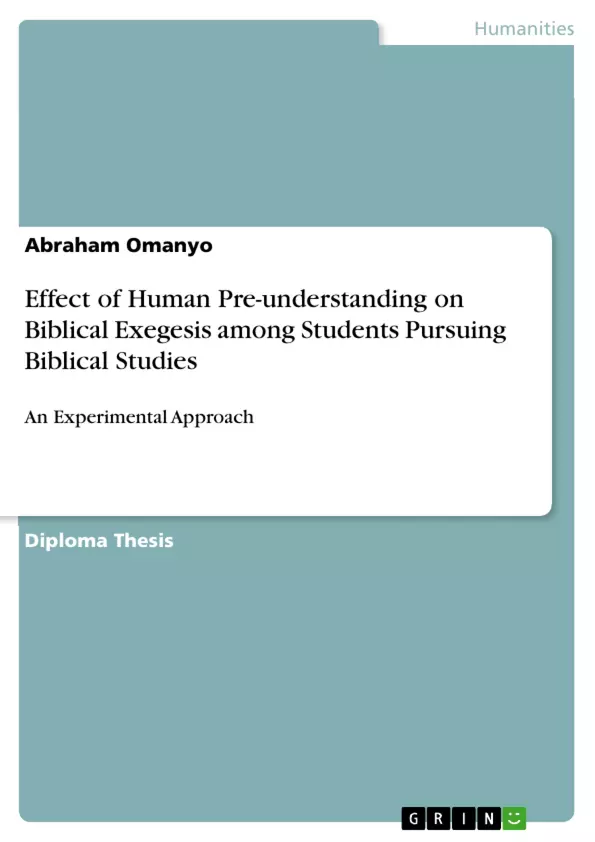What is the effect of informational and methodological pre-understanding on biblical exegesis? The study wants to determine the effect of human pre-understanding on biblical exegesis among students pursuing biblical studies at Northwestern Christian University College, Awasi Satellite Campus.
The Bible is the oldest historic book of faith which has been used worldwide. It is God breathed (2 Timothy 3:16). It is the basis of most faiths in the world (Hebrew 12:2). Proper understanding and interpretation of the bible is therefore useful for spiritual nourishment of the society. Although there are several attempts to create universal exegetical meaning of the biblical texts by looking into historic and cultural contexts, the human perceptual effect has been diminishing in the picture as marked by limited research on the same. Since Northwestern Christian University College recently initiated its theological satellite campus in Awasi Town with new crop of students who might experience perceptual effect in biblical exegesis, this factor motivated the present study. The present study employed experimental approach to study the effect of human pre-understanding on biblical exegesis among the students at NCUC.
The study may be beneficial to various individuals and institutions in different ways. The church ministers will be informed on the effects of human pre-understanding on biblical exegesis. This may help to reduce the biblical exegetical issues related to scriptures misunderstanding. As the biblical exegetical challenges are being sorted out, the body of Christ will be well nourished, hence the kingdom of God will be extended (Mathew 28:19). The study will also set a basis in biblical exegetical research, on which the potential bible scholars and theologians may apply for further research.
Inhaltsverzeichnis (Table of Contents)
- CHAPTER ONE
- INTRODUCATION
- 1.1 Background to the Study
- 1.2 Statement of the Problem
- 1.3 Research Objectives
- 1.3.1 General Research Objective
- 1.3.2 Specific Research Objectives
- 1.4 Research Questions
- 1.5 Research Hypotheses
- 1.6 Justification and Limitation of the Study
- 1.6.1 Justification
- 1.6.2 Limitation
- 1.7 Scope and Delimitation of the Study
- 1.8 Theoretical and Conceptual Framework
- 1.8.1 Theoretical Framework
- 1.8.2 Conceptual Framework
- CHAPTER TWO
- LITERATURE REVIEW
- 2.1 Introduction
- 2.2 Informational Pre-Understanding and Biblical Exegesis
- 2.3 Methodological Pre-Understanding and Biblical Exegesis
- 2.4 Summary of the Knowledge Gaps
Zielsetzung und Themenschwerpunkte (Objectives and Key Themes)
This research project aims to quantitatively investigate the effect of pre-understanding on biblical exegesis among students at Northwestern Christian University College. It utilizes an experimental design to analyze how prior knowledge and methodologies influence interpretation.
- The impact of informational pre-understanding on biblical exegesis.
- The influence of methodological pre-understanding on biblical exegesis.
- The role of gender in biblical exegesis.
- The effect of educational background on biblical exegesis.
- The influence of marital status on biblical exegesis.
Zusammenfassung der Kapitel (Chapter Summaries)
Chapter One: Introduction This chapter sets the stage for the research, outlining the background, problem statement, research objectives and questions, hypotheses, justification, limitations, scope, and the theoretical and conceptual frameworks guiding the study.
Chapter Two: Literature Review This chapter reviews existing literature on the relationship between informational and methodological pre-understanding and their influence on biblical exegesis. It identifies knowledge gaps that this research seeks to address.
Schlüsselwörter (Keywords)
Biblical exegesis, pre-understanding, informational pre-understanding, methodological pre-understanding, experimental design, quantitative research, gender, education, marital status.
- Citation du texte
- Abraham Omanyo (Auteur), 2024, Effect of Human Pre-understanding on Biblical Exegesis among Students Pursuing Biblical Studies, Munich, GRIN Verlag, https://www.grin.com/document/1515146



